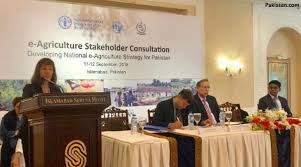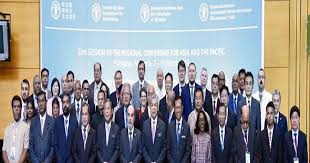Pakistan participates in FAO’s Regional Conference

Bangkok: The Food and Agriculture Organization of the United Nations convened the Thirty-fifth session of the Regional Conference for Asia and the Pacific(APRC 35) virtually from 1-4 September 2020 hosted by the Royal Government of Bhutan.
The conference focused on regional priorities and pressing issues such as COVID 19, the state of agriculture, natural resources management, food security and nutrition.

The conference is also addressing and highlighting examples of partnerships, innovation and digital technologies that are helping to improve food security and nutrition across the region as well as regional and global policy and regulatory matters.
On the third day of the FAO Regional Conference for Asia-Pacific, the FAO Director-General QU Dongyu, Government Ministers as well as civil society and private sector representatives voiced concern over COVID-19’s impacts on the food security and livelihoods of millions of people, and urged for greater action to overcome the food and agriculture challenges facing the region.
The FAO Director-General highlighted that small and vulnerable farmers must be at the centre of the response. “Smallholder farmers and their families, food workers in all sectors, and those living in commodity- and tourism-dependent economies are particularly vulnerable. They urgently need our attention,” QU urged.
The Asia-Pacific region is home to more than half of the world’s undernourished people, and with the impacts of COVID-19 the number of hungry people in Southern Asia could rise by nearly a third to 330 million in the next ten years.
The speakers noted the importance of acting in two fronts simultaneously: revising public policies and implementing practical measures in the field.
“The novel coronavirus has implications for local, national, regional and global policies and it is important that global and local conditions alike are recognized when confronting this pandemic,” said the Independent Chairperson of the FAO Council, Khalid Mehboob.
“The coronavirus pandemic has exposed the vulnerability and weaknesses of already fragile global food systems. We must take urgent action to transform our food systems,” stressed Thanawat Tiensin, the Chairperson of the Committee on World Food Security (CFS), an international and intergovernmental platform which includes the private sector and civil society and reports to the FAO Conference and the UN General Assembly through the Economic and Social Council (ECOSOC).
For a sustained and stronger collaboration, the FAO chief presented the organization’s recently launched COVID-19 Response and Recovery Programme – aimed at mitigating the immediate impacts of the pandemic while building back better – as well as other key initiatives, with focus on innovation, that can accelerate global hunger-fighting efforts. These include the establishment of an FAO office of innovation and the creation of an international platform for digital food and agriculture, as well as the Hand-in-Hand Initiative, which is supported by “state-of-the-art tools”, namely the Hand-in-Hand Geospatial Platform and the FAO Data Lab for statistical innovation.
“The point of all these initiatives is to get the latest knowledge and tools into the hands of decision makers but also smallholder farmers, fishers, herders and foresters. This is the region where a vast majority of smallholders are producing the food and agricultural products that we rely upon,” said QU.
“We need to take full advantage of the digital age through innovative partnerships with national governments, farmers, the private sector, academia, NGOs and many others,” he urged.
Representing Pakistan at the Ministerial Session of the Regional Conference, Federal Minister for National Food Security & Research, Syed Fakhar Imam stated that “During these difficult times of COVID-19 and locust invasion, we are trying to sustain particularly those people living below the poverty line. With the efforts of the current government, there have been transformations in policies. He further stated that we need to upgrade and digitalize our agro-technology and carry out the best practices as being followed in the advanced countries.
Increase in agricultural productivity can happen when policies are framed, which will benefit the farming community. We want to bring a better balance between different sectors of the economy manufacturing agriculture and the service sectors, said Mr. Fakhar Imam.
“The FAO 35th Regional Conference has provided a valuable virtual platform for Members to exchange their views, knowledge and experience in addressing food security and nutrition challenges amidst COVID19 pandemic, to identify Regional priorities, new ways of working and collective actions to accelerate progress towards the eradication of poverty (SDG1) and hunger and all forms of malnutrition (SDG 2).
The Government of Pakistan has actively contributed by sharing perspectives of its development strategy: Pakistan is targeting population below the national poverty line, and small holder farmers agriculture transformation by agro-ecological zones, in an effort to contain the combined impacts of COVID-19 on food systems, climate hazards and the recent Desert Locust national emergency in a slowing down economy”, said Mina Dowlatchahi, Country Representative in Pakistan.
Several participants, including representatives from Pakistan, conveyed interest in and support for the organization’s current key initiatives such as Hand-in-Hand. Others acknowledged the important role innovation and technologies could play in improving food production and security.





